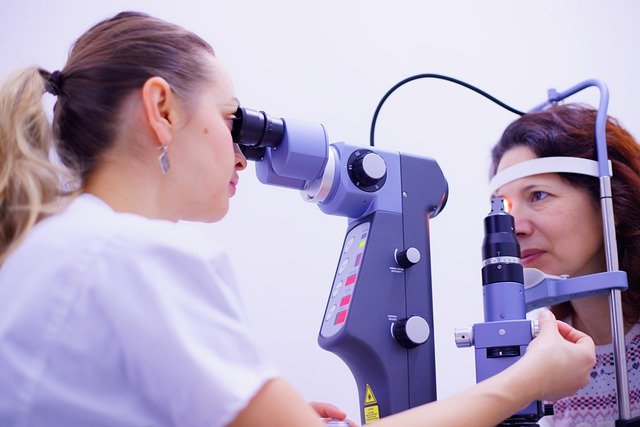
Cataracts are cloudy areas in your lens that can cause things to be fuzzy or blurry. You could also have colors appear faded, have double vision, or your eyes can be extra sensitive to light. When left untreated, cataracts can lead to blindness so it’s important to get treatment and prevent them from getting worse. Developing cataracts can be a normal part of the aging process and more than half of Americans older than 80 have developed cataracts.
However, cataracts can also develop earlier due to things such as obesity, diabetes, high blood pressure, family history, smoking, or eye treatment. You aren’t able to just treat cataracts with diet or exercise, but you can do certain things to prevent cataracts from progressing. It’s important to find a cataract surgeon near you in order to get treatment for cataracts to prevent your vision from getting worse and eventually leading to blindness.
Cataract Surgery
If prescription glasses can no longer improve your condition, then the only option for treatment for cataracts is surgery. Find a cataract surgeon near you in order to determine whether or not surgery is right for you. Many eye doctors will suggest considering surgery when cataracts affect your quality of life and start to interfere with the ability to perform activities such as driving at night or reading. You will need to decide with your eye doctor when it’s right for you. While there may not be a rush to remove cataracts for many people, cataracts can worsen quicker in those with certain conditions, such as high blood pressure, obesity, and diabetes.
What Happens During a Surgery?
During surgery, your eye surgeon will remove the clouded lens and then replace it with a clear artificial lens that matches your vision deficiencies, for some people this means having a multifocal lens fitted, whilst others require a monofocal lens. This lens is positioned in the same way as your natural lens that is being removed and becomes a permanent part of your eye. Some people that have other eye issues may not be able to use an artificial lens. In these cases, once the cataract is removed, vision may need to be corrected with contact lenses or eyeglasses. Cataract surgery is typically done on an outpatient basis, and you won’t have to stay at the hospital after the surgery. During surgery, your doctor uses an anesthetic locally to numb around the eye. You will be awake during the procedure.
Even though the procedure is considered safe, there is a risk of bleeding or infection. It can also increase the risk of retinal detachment. After the procedure, you may have some discomfort for a few days but healing will happen within a few weeks. If you need cataract surgery in both eyes, then your eye surgeon will schedule the procedures separately. After the first eye heals, you will have the procedure completed in your second eye.
Preparing for an Eye Appointment
If you notice issues with your vision, make an appointment with your eye-care provider. If you are diagnosed with cataracts, then you can be referred to an eye specialist in order to do the surgery. Make sure to list any symptoms you have, even ones that seem unrelated. Keep a list of all medications, supplements, and vitamins you are taking. If possible, bring along a trusted friend or family member to help you get all the information. It can be harder to absorb it all at once during your appointment.
Dealing with Cataracts before Surgery
There are a few things you can do to help deal with cataracts before surgery. Make sure your contact lens or eyeglasses prescription is up to date to help with your vision. If you need some extra help reading, use a magnifying glass. Improve lighting in your home with brighter or more lights in order to help with vision. When you are outside during the day, be sure to use a broad-brimmed hat or sunglasses in order to reduce glare. You may need to limit your night driving since cataracts can make it harder to see at night. Self-care measures are only able to help for a while, but as the cataract progresses, your vision may deteriorate further. When the vision loss starts to interfere with activities, you will need to think about cataract surgery.
Preventing Cataracts
There are certain things you can do to lower your risk of developing cataracts.
Regular Eye Exams
Seeing your eye doctor on a regular basis can make sure you get your vision tested and diagnose any problems before they get worse and become even more damaging.
Watch Blood Sugar if You Have Diabetes
Cataracts happen more often in those with diabetes. If your blood sugar is too high for too long then the lens in your eye swells and this can increase the risk of cataracts.
Quit Smoking
Smoking is associated with many different serious health conditions that can lead to cataracts. Speak with your doctor about different strategies you can use to quit smoking, including medications.
Reduce Your Alcohol Consumption
If you have more than two drinks a day, it can increase your risk of developing cataracts.
Eat a Balanced Diet
Eating a diet full of vegetables and fruits will give you important vitamins, such as Vitamin C and Vitamin E, that are necessary for optimal eye health.
Wear Sunglasses
Ultraviolet rays can damage your eyes, even on a cloudy day, since the rays can reach through clouds. Wearing sunglasses can block these rays.
Hey welcome to my blog . I am a modern women who love to share any tips on lifestyle, health, travel. Hope you join me in this journey!

Speak Your Mind